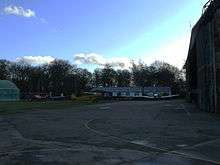Panshanger Aerodrome
| Panshanger Aerodrome | |||||||||||
|---|---|---|---|---|---|---|---|---|---|---|---|
 | |||||||||||
| IATA: none – ICAO: EGLG | |||||||||||
| Summary | |||||||||||
| Airport type | Private-owned, Public-use | ||||||||||
| Owner | Mariposa Investments | ||||||||||
| Operator | Closed | ||||||||||
| Location | Welwyn Garden City | ||||||||||
| Elevation AMSL | 250 ft / 76 m | ||||||||||
| Coordinates | 51°48′07″N 000°09′30″W / 51.80194°N 0.15833°WCoordinates: 51°48′07″N 000°09′30″W / 51.80194°N 0.15833°W | ||||||||||
| Map | |||||||||||
 EGLG Location in Hertfordshire | |||||||||||
| Runways | |||||||||||
| |||||||||||
Panshanger Aerodrome (ICAO: EGLG) was a former general aviation aerodrome located on the most eastern tip of Welwyn Garden City, Hertfordshire, England, 2.5 NM (4.6 km; 2.9 mi) west of Hertford, East Hertfordshire.
Wartime history
During the Second World War, the airfield was used by Royal Air Force units for training purposes and a large Bellman type hangar was erected to accommodate the based aircraft. This structure still exists.
No. 1 Elementary Flying School, equipped with Tiger Moth biplane trainers was active at the aerodrome from September 1942. No. 127 Gliding School was operational at Panshanger from August 1943 until closure in May 1948.
After the war, No. 1 Reserve Flying School was based at Panshanger from May 1947 until its closure in May 1953. It was managed by De Havilland Aircraft.[2]
Postwar operations

From 1946, the airfield was used by flying clubs for training and recreational flying, and also by private owner pilots. A small arched hangar with canvas end closures was in use by 1953.
During its time of operation, Panshanger Aerodrome had a United Kingdom Civil Aviation Authority Ordinary Licence (Number P782) that allowed flights for the public transport of passengers or for flying instruction as authorised by the licensee. The aerodrome was not licensed for night use.[3]
The aerodrome was once home to the North London Flying School (a trading name of East Herts Flying School), which offered Fixed-Wing PPL, instructor and aerobatics training. The school used Piper Cherokee aircraft for most of its training, although it also owned a Piper J-3 (Cub), an Extra 300L and a Piper PA-32R (Saratoga) for other training and hire purposes.

De Havilland apprentices were offered subsidised flying training at Panshanger from 1949 to 1952 on Tiger Moths and Chipmunks.
Aerodrome Under Threat
The aerodrome had been under threat from a planning proposal to build 700 houses on the site following the expiry of the lease. Many hundreds of local residents, pilots, aviation organisations and members of the North London Flying Club were against the proposal which ended its public consultation on 31 January 2014. A HM Government e-Petition against the plans was set up but failed to attract enough signatures to move to debate. A 'Save Panshanger' website and Facebook page were also set up in support of the aerodrome's operations.
Aerodrome Closure
The aerodrome closed on 20 September 2014 following the expiry of the lease[4] from the land owner, Mariposa Investments, who intended to re-designate the use of the land for other purposes. The flying school and restaurant also closed.[5] There have been efforts to have it re-opened, with campaigners aiming to convince the council that the aerodrome was a great economic and social asset.
A potential reprieve reported 28 July 2016. After strong representations, the local Council hope to pursue a mixed use option, with general aviation activities alongside a smaller number of new houses on part of the airfield site [6]
References
Sturtivant, Ray (1997). RAF Flying Training and Support Units. Air-Britain (Historians) Ltd. ISBN 0-85130-252-1.